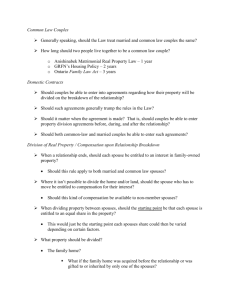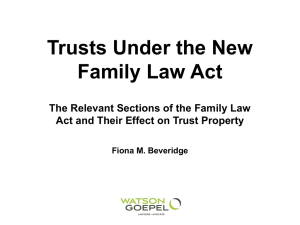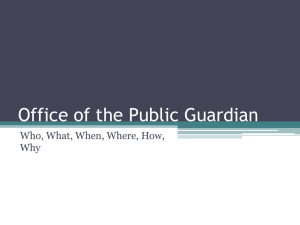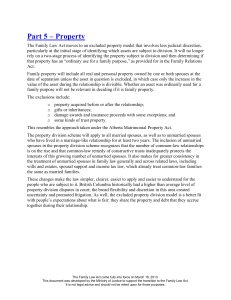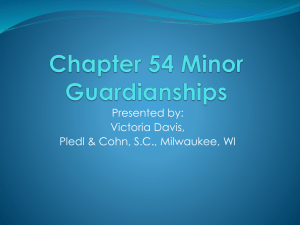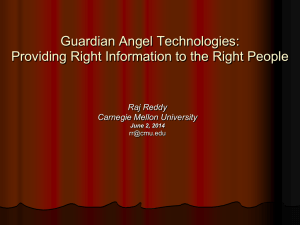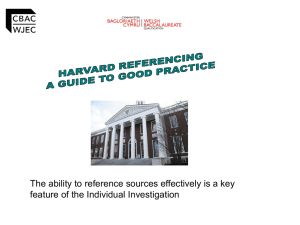Family Law Act - Bull, Housser & Tupper
advertisement
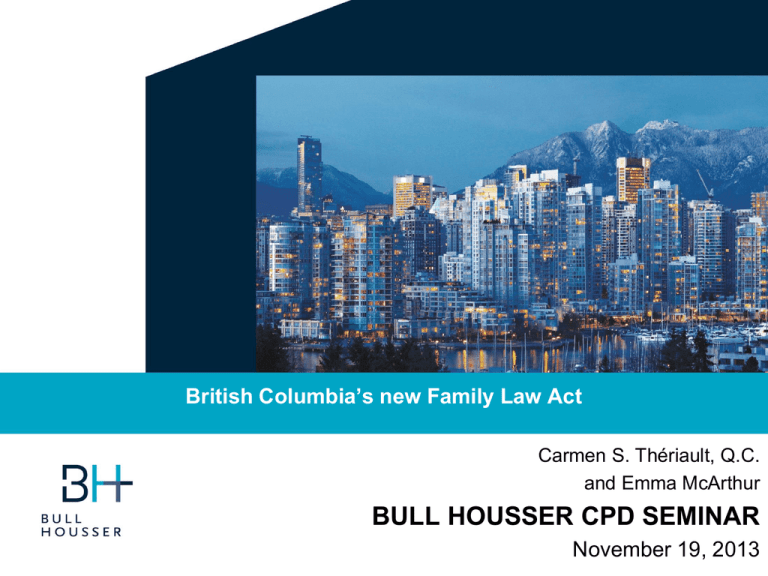
British Columbia’s new Family Law Act Carmen S. Thériault, Q.C. and Emma McArthur BULL HOUSSER CPD SEMINAR November 19, 2013 Former Family Relations Act Regime • Rights of married and common law spouses are different • Division of “family purpose assets” available only to legally married spouses or those spouses who have opted in under s. 120.1 of the Act • Non family purpose assets(including business assets) are excluded in the absence of direct/indirect contribution by non-owning spouse • Family assets could be reapportioned if the court feels a 50/50 division was unfair 2 Highlights of B.C.’s new Family Law Act • Property rights for common law spouses • All property is divisible, regardless of use by one or both spouses, unless it is “excluded” property • Shared liability for “family debt” • Enforceability of marriage and cohabitation agreements appears to have been strengthened 3 1. Definition of “Spouse” - section 3 Spouses are persons who: a) are legally married, b) have lived in marriage like relationship for continuous period of at least 2 years, or c) have lived in marriage-like relationship [no duration specified] if they have a child – but (c) is only relevant for spousal support purposes 4 2. Family Property that will be divided: a) all property that either spouse owns or has a beneficial interest in on the day they separate that does not qualify as “excluded property”, and b) property acquired after the date of separation that is derived from the family property referred to above. 5 Continued. . . Family property includes among other things: - s. 84(a) a) a share or an interest in a corporation b) an interest in a partnership, an association, an organization, a business or a venture c) the amount by which the value of excluded property has increased since the later of the date the relationship began or the excluded property was acquired 6 Excluded property includes: a) property owned by a spouse before the relationship began b) gifts and inheritances c) settlement and damage awards from tort claims – except awards meant to compensate both spouses or to replace wages d) non-property related insurance proceeds 7 Continued... e) property previously referred to that is held in trust for a spouse f) property held in certain discretionary trusts – s. 85(1)(f) trust g) property traceable back to excluded property 8 When is Excluded Property Divided? a) If it increases in value during the relationship, the increase is divided b) If family property/debt located out of BC can’t practically be divided, the court may make an order requiring the division of excluded property 9 Continued... c) If it would be significantly unfair not to divide excluded property on consideration of: • the duration of the relationship, and • a spouse’s direct contribution to the preservation, improvement, operation or management of the excluded property 10 When will a court order an unequal division of family property? • Pre-requisite for unequal division is significant unfairness (under previous law it was simply “unfairness”) • Factors to be considered by are listed in the FLA • Court can also order unequal division of family debt 11 3. Triggering event and valuation • Triggering event is the date of separation • Valuation date is (1) the date an agreement is signed or (2) the date of the hearing before the court - unless the spouses agree otherwise or court orders otherwise 12 4. Marriage and Cohabitation Agreements • The provisions of the FLA are subject to the spouses’ agreement otherwise • Agreements may be set aside for reasons of procedural unfairness or for substantive reasons 13 • Agreements may be set aside due to defects in the process of making the agreement: • failure to make proper disclosure, • a spouse takes improper advantage of the other’s vulnerability, ignorance, need, • a spouse did not understand nature and consequences of agreement, or • other circumstances which would make all/part of a contract voidable at common law Continued. . . Agreements may also be set aside if it would be “significantly unfair” not to do so, having regard to: • length of time that has passed since the agreement was executed • intentions of the parties to achieve certainty • the degree to which the spouses relied upon the terms of the agreement 15 Transition The Family Relations Act continues to apply where: • agreement made before the FLA comes into force – e.g March 18, 2013 – unless spouses agree otherwise • a proceeding respecting property division has already been started under the FRA (with some exceptions) 16 7. Guardianship Ways guardianship of a child can be obtained: • parents • court order • temporary guardianship • standby guardianship • testamentary guardianship 17 Continued... Parents as Guardians: • each parent of a child is a child’s guardian (s. 39) • If a child’s guardian marries or enters into a marriagelike relationship, the new spouse does not become a guardian of the child by reason only of the marriage or relationship 18 Continued... Guardians have parental responsibilities – s. 41 and 43 • modeled largely on s. 18 of Alberta’s Family Law Act • reflects traditional role/authority of a parent • must be exercised in the best interests of the child 19 Continued... A Guardian is not: • a trustee of a child’s property • entitled to provide a valid discharge for receipt of property on behalf of a child, subject to limited exception 20 Continued... Guardian is temporarily unable to exercise certain parental responsibilities? – s. 43(2) • the guardian may, in writing, authorize another person to do so • temporarily is not a defined term 21 Continued... Appointment of Guardian in case of death – s. 53(1) • in a Will or in the prescribed form – see Family Law Act Regulation, BC Reg. 347/2012 • can now be exercised by parent and non-parent guardians 22 Continued... Appointment of Standby Guardian – s. 55 • where there is only one guardian and he/she faces terminal illness or permanent mental incapacity • can appoint a person to become a guardian with the appointing guardian when the conditions in the appointment are met 23 British Columbia’s new Family Law Act: Family Law and Estate Planning Implications Carmen S. Thériault, Q.C. and Emma McArthur BULL HOUSSER CPD SEMINAR November 19, 2013


